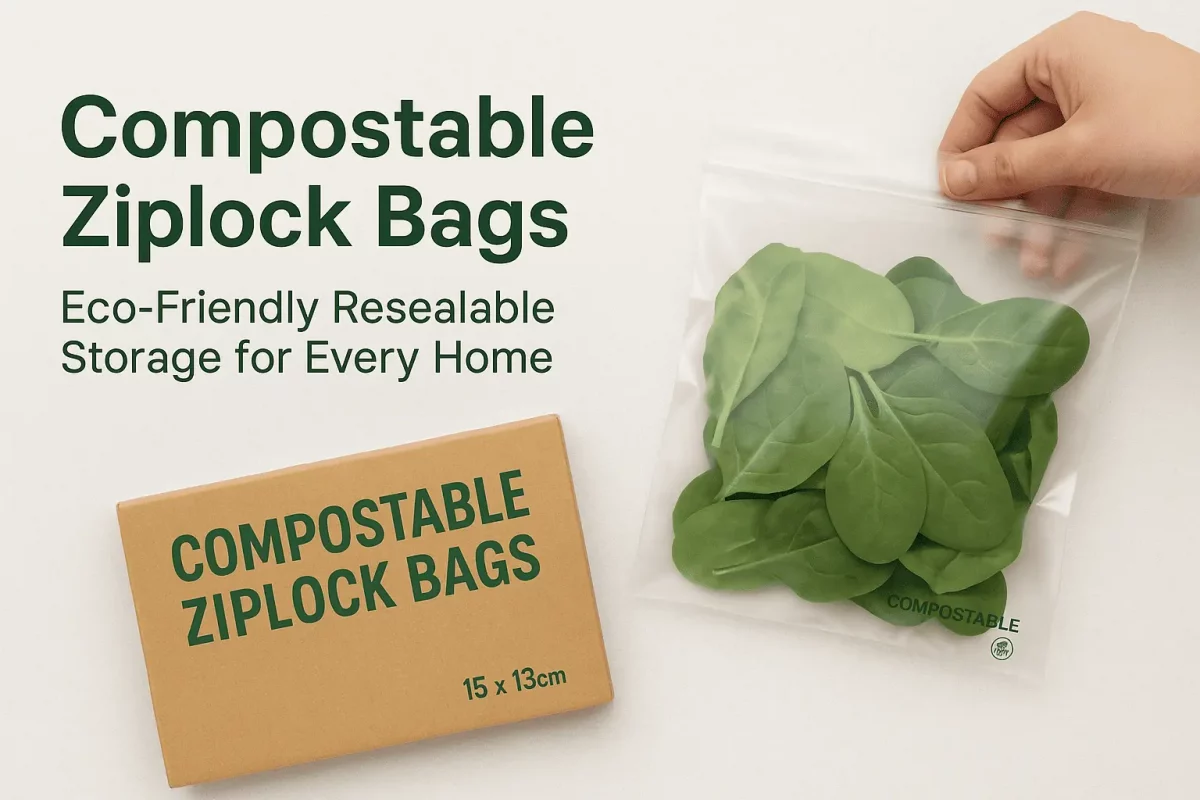Compostable Ziplock Bags – Eco-Friendly Resealable Storage for Every Home
TL;DR: Compostable ziplock bags are the planet-friendly upgrade to plastic storage. Made from renewable, plant-based materials, they keep food fresh, reseal easily, and fully decompose in both home and industrial composting. They leave no trace, helping UK households cut single-use plastic for good.
Why It’s Time to Ditch Plastic Ziplock Bags
Most of us have a drawer full of plastic ziplock bags. They’re convenient, but they’re also one of the most wasteful single-use items in British homes. Standard polyethene ziplock bags take centuries to degrade. Even when they do, they fragment into microplastics that pollute soil, water, and the food chain.
At Boring Basics, we believe sustainability should be simple. Our compostable ziplock bags perform like traditional ones, being airtight, leak-resistant, and reusable, but without the long-term harm. They’re proof that everyday convenience can coexist with environmental responsibility.
This guide explains what makes compostable resealable bags different, how to use them in your home or business, and how to dispose of them properly within UK composting systems.
What Makes a Ziplock Bag Truly Compostable?
The Materials: PBAT and PLA Explained
Compostable ziplock bags are made from PBAT (Polybutylene Adipate Terephthalate) and PLA (Polylactic Acid), two advanced plant-based biopolymers.
- PBAT gives flexibility and strength, allowing the bag to stretch and seal tightly.
- PLA, made from fermented corn or sugarcane starch, provides structure and transparency.
Together, they create a bag that feels like plastic but behaves like nature. When composted, these materials break down into water, carbon dioxide, and organic biomass, leaving nothing harmful behind.
All Boring Basics compostable bags meet EN13432 certification, the recognised European composting standard. Many are also home compostable, certified under TÜV Austria’s OK Compost Home scheme.
Compostable vs Biodegradable vs Plastic
Not all “eco-friendly” bags live up to the label.
- Plastic: Petroleum-based, non-renewable, and never fully decomposes.
- Biodegradable: Breaks down into smaller fragments, but often leaves behind microplastics and toxins.
- Compostable: Made entirely from renewable plants and breaks down fully under composting conditions.
Compostable bags are the only truly plastic-free resealable storage option. They support the UK Government’s strategy to reduce plastic contamination in food waste streams—a key goal championed by WRAP.
Everyday Uses in UK Homes
In the Kitchen
Compostable resealable bags are strong, moisture-resistant, and versatile. Use them for:
- Sandwiches, snacks, and packed lunches
- Leftover vegetables, cheese, or cooked meals
- Freezing soups, curries, or sauces
- Marinating fish or meat
- Storing dry ingredients like pasta, grains, and nuts
They perform just like standard ziplock bags, but go in the compost when you’re done.
Try our:
- 15×13 cm Compostable Ziplock Bags — perfect for snacks and small portions
- 18×19 cm Compostable Ziplock Bags — ideal for batch-cooked meals and larger items
Beyond Food Storage
Compostable ziplock bags aren’t limited to the kitchen. They help organise every corner of your home:
- Store toiletries, makeup, and travel essentials
- Keep receipts, craft items, or stationery in order
- Protect cables, chargers, and electronics
- Store seeds, bulbs, and garden accessories
For Small Businesses and Cafés
Eco-aware UK cafés, delis, and shops are replacing single-use plastics with compostable resealable bags. They use them for:
- Fresh sandwiches, baked goods, or loose snacks
- Packaging herbs, spices, tea, or coffee
- Takeaway condiments or sample packs
- Plastic-free retail packaging
It’s a simple, visible sustainability choice that aligns with modern consumer expectations and the UK’s growing shift toward zero-waste retail.
How to Dispose of Compostable Bags in the UK
Disposal is key to ensuring your compostable bags break down properly. Here’s how to handle them responsibly.
Home Composting
If your bags display the OK Compost Home logo, you can compost them in your garden heap.
- Tear bags into smaller strips to speed decomposition.
- Mix them evenly with other organic waste, like vegetable peelings and leaves.
- Avoid adding greasy or heavily soiled bags.
They’ll usually break down within 6–12 months, depending on temperature and moisture.
Council or Industrial Composting
Many UK councils now accept certified compostable packaging in food waste bins, which go to industrial composting facilities.
- Check your local council’s waste page or GOV.UK to confirm acceptance.
- Only add certified compostable bags (EN13432).
- Don’t mix them with conventional plastic liners.
Industrial composting operates at higher temperatures, breaking materials down within 8–12 weeks.
What Not to Do
- Don’t recycle them with plastics. They’ll contaminate recycling streams.
- Don’t landfill unless unavoidable; they need oxygen and microbes to decompose.
- Don’t burn them, as it wastes valuable organic material.
If composting options are unavailable, place them in general waste; they’ll still break down faster and cleaner than petroleum plastic.
Compostable Bags and Food Safety
Our compostable ziplock bags are food-grade certified, BPA-free, and compliant with EU and UK food-contact safety regulations.
They’re safe for both raw and cooked food, suitable for refrigeration, and freezer-safe for short-term use. The plant-based polymers don’t leach chemicals or odours, even under heat or moisture.
Rinse and dry bags after use to extend their lifespan before composting.
Learn more about safe compostable food wraps in our article: Are Compostable Cling Films Really Compostable?.
How Compostable Bags Break Down
Once in compost, microbes feed on PBAT and PLA, turning them into natural compounds.
- Weeks 1–4: The bag softens and begins fragmenting.
- Weeks 5–10: Heat and moisture accelerate microbial activity.
- Weeks 10–12: The material converts into carbon dioxide, water, and nutrient-rich biomass.
After around three months in an active compost pile, the bag is gone, leaving behind healthy soil matter instead of pollution.
Why Choose Boring Basics
At Boring Basics, we focus on functional sustainability, practical, affordable, and transparent.
Our compostable ziplock bags are:
- Made from 100 % plant-based materials
- Plastic-free, BPA-free, and non-toxic
- Durable, leak-resistant, and reusable
- Certified home and industrial compostable
- Shipped in FSC-certified, plastic-free packaging
Pair them with our Compostable Cling Film (30 m) for a fully sustainable kitchen setup.
Every product we sell lists its materials clearly. No greenwashing, no hidden plastics, just straightforward eco solutions.
Living Plastic-Free, One Step at a Time
The UK throws away millions of single-use plastic bags every year. Compostable alternatives make a measurable difference.
By choosing compostable ziplock bags, you’re reducing landfill waste, cutting microplastic pollution, and supporting renewable material innovation.
For deeper reading, explore our eco blog:
- Biodegradable vs Compostable: What’s the Real Difference?
- What Makes a Product Truly Eco-Friendly?
- How to Dispose of Compostable Phone Cases Properly
Knowledge helps small actions scale into real environmental change.
Frequently Asked Questions
Yes. Compostable bags handle cold storage well for short-term use. They remain flexible and won’t crack.
High-quality PBAT + PLA blends are tough and flexible. They seal tightly and resist tearing, even during daily use.
Yes, if labelled “home compostable.” Industrial-only bags need higher temperatures to decompose.
Yes. Rinse and dry after use. Once worn out, compost them
Slightly, but costs are falling as adoption grows. The environmental gain outweighs the minor price difference.
Make the Switch Today
Choosing compostable ziplock bags isn’t about perfection—it’s about progress. Every pack you buy replaces hundreds of plastic ones that would otherwise linger for centuries.
Each resealable bag helps UK households lower waste, reduce plastic pollution, and support cleaner composting systems.
Start small. Store smarter. Shop Compostable Ziplock Bags today and make sustainability part of your everyday routine.
Every pack helps reduce plastic waste in UK households.

